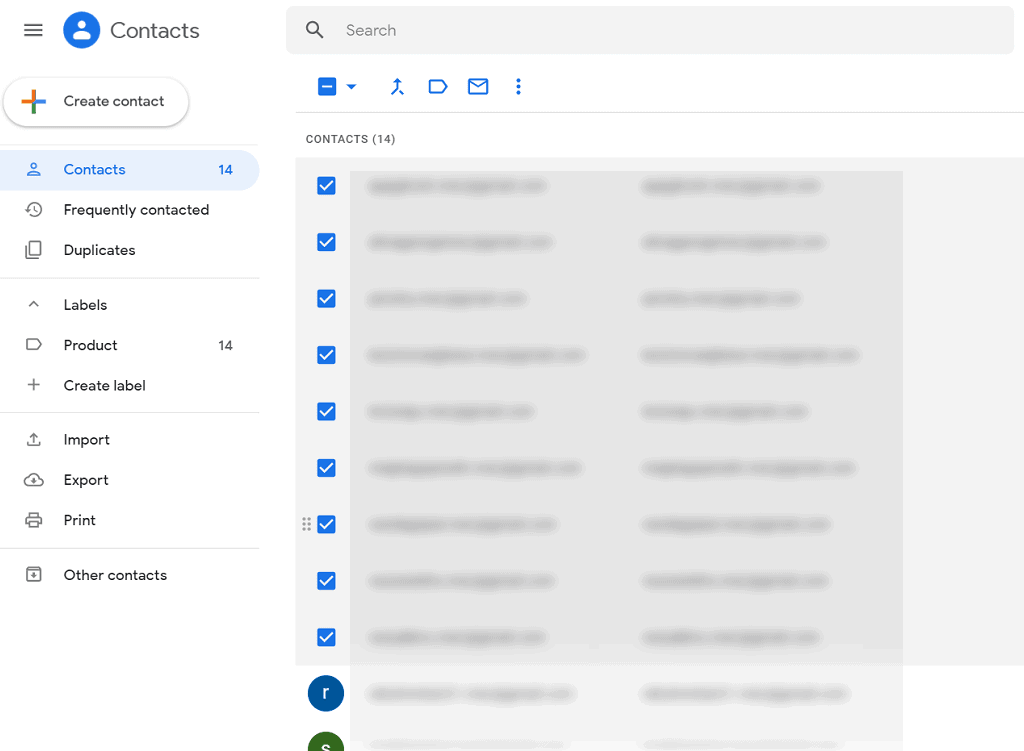20 Handy Facts For Deciding On Email List Sellers
Wiki Article
What Are The Factors I Should Be Thinking About When Purchasing An Email List For Family Medicine?
When buying an Family Medicine email list, certain factors should be considered in order to receive high-quality, accurate and legally-compliant data that is effective for your outreach or marketing campaigns. What you should consider is:1. Data Quality and Accuracy
Data source: Ensure that the data provider collects information from trusted and verified sources. This includes licensing bodies, medical directories, professional associations or opt-in databases. Email addresses for family medicine doctors' addresses should be relevant, current, and tailored to the audience you are targeting.
Verification procedure: Learn about the provider's verification procedure. It is important to regularly keep up-to-date and tidy the list of email addresses, eliminating inactive email addresses or those which are not correct. Validated messages lower the number of bounces and improve delivery.
Segmentation options. The list should permit segmentation based on criteria such as geographical area (country/state/city) or years of experience (or practice size), or areas of interest. Segmentation can be used to increase engagement through more specific outreach.
2. Legal Regulations
Data Privacy Laws : Ensure your list is compliant with the General Data Protection Regulations (GDPR) for Europe, California Consumer Privacy Acts (CCPA) for the U.S.A., as well as other privacy laws applicable to. To avoid repercussions from regulators emails must be legally collected with consent.
CAN SPAM Act Compliance: When you run email marketing campaigns in the U.S.A. be sure to be in compliance with the CAN SPAM Act. Also, you should provide clear opt-out options and avoid deceitful or misleading information on the subject line.
Confirm opt-in consent was granted to gather the email address. This means that family medicine physicians consented to receiving marketing emails from third-party companies, which ensures compliance with privacy laws as well as lessening the chance of complaints about spam.
3. Provider Reputation
Reputable Supplier: Pick one with a long-standing record of providing data that is compliant and of top-quality. Check out customer reviews, testimonials, as well as case studies, to ensure the service is reliable and reliable.
Transparency. Providers must be open and honest about the methods that they employ to collect data as well as how often they update it. If the company doesn't know what sources they can use to obtain their data, it's an alarming indicator.
Customer Support: Ensure the service you choose offers solid support service for customers. You may need help in tackling technical issues, segmentation of lists, or making sure the list is in compliance with the rules.
4. Cost and Return on Investment
Pricing Models. Different pricing options are available from companies, including flat fees, pay per-contact or subscription services. Select a pricing model that is compatible with your budget while ensuring a good return on investment.
Refund/Replacement Policy: Many reputable providers offer the option of a replacement or return policy in the event that your email address is inactive or outdated. Be sure to read all the terms and conditions before you make a purchase.
Don't solely focus on cost. Although a list with a lower price may seem appealing, it could lead to poor deliverability or excessive bounce rates. It's better to buy a premium list that provides better targeting and higher engagement rates.
5. Data ownership and usage
Single Use or. Clear the confusion of multiple use If you're able to utilize this list multiple times or if this is an one-time use only. Lists which allow for multiple campaigns are more beneficial especially if you're planning ongoing outreach.
Exclusive vs. Shared lists: Find out whether the list belongs to you exclusively or is being sold to buyers from other sources. Exclusive lists aren't likely to lead to an over-saturated audience and are more likely to increase engagement.
6. Data Integration and Format
Compatibility with CRM: Ensure you have the email list in a format that is compatible with either your CRM system (CRM) or with your email marketing tool. (Example, CSV). This will ensure seamless integration and ease of use.
Accessibility: The list must be simple to sort, segment or organize according to the criteria of your campaign. This will make it easier to simplify your messaging and targeting efforts.
7. Ethical Questions
Relevance in Outreach: Family physicians are busy professionals. So, ensure you customize your outreach to meet the needs of your clients. Beware of messages that are irrelevant and generic. This can damage your reputation as a brand, leading to lower engagement rates or complaints about spam.
Avoid spamming practices: Avoid excessive emailing and sending emails in a planned manner. Inundating recipients with too many emails and irrelevant offers may cause unsubscriptions from your email list and spam reports, or even damage to your sender's reputation.
The final sentence of the article is:
When you buy an email list from Family Medicine, ensure you pay attention to the quality of data as well as the legal compliance and reputations of the providers to ensure your success with your outreach. Find segmented, validated data which is compliant to privacy laws and is aligned with the audience you want to reach. By investing in lists of high-quality and delivering relevant messages, you will improve engagement rates as well as maximize the ROI of your marketing. See the best family medicine email list for website guide.

What Should I Consider When Buying An Oncologist Email List?
It's crucial to ensure that the list of oncologists you purchase is of high quality legal, regulated and specifically targeted to your marketing goals. Here are a few key aspects to take into consideration. Quality and Accuracy of the Data
Source of information: Make sure that the list originates from trustworthy, reliable sources such as medical directories, professional associations, or a healthcare database. Avoid lists coming from unreliable sources or ones that have not validated, since they may contain outdated information.
Verification Process: The list service should have a thorough verification procedure to ensure that email addresses are accurate legitimate, valid, and active. The list provider must periodically clean and update the list, eliminating inactive, incorrect or duplicate information about contacts. This will increase delivery rates.
Segmentation. A quality oncologist's email list should provide segmentation. Being able to filter the list by subspecialties (e.g., pediatric oncology, surgical oncology, hematology-oncology), geographic location, years of experience, or institution allows for more targeted outreach, increasing the likelihood of engagement.
2. Legal Regulations
Data Privacy Regulations â Ensure that your email list is compliant entirely with the applicable laws. The General Data Protection Regulations, or GDPR which is in Europe as well as the California Consumer Privacy Act, or CCPA which is in the U.S.A. Email addresses should be legally collected and processed in accordance with data privacy and consent.
CANSPAM Act compliance: If you are running a campaign within the United States, make sure that your list complies with the CANSPAM Act, that governs all commercial emails. You should include an opt-out option in your email, make sure your subject lines are accurate and be sure to not mislead your recipients. Infractions could lead to sanctions as well as damage to your reputation.
Opt-In Consent: Make sure the email addresses listed on the list were obtained via opt-in consent. Oncologists must have signed permission to receive marketing emails. This ensures compliance with privacy law and reduces chances of legal problems or spam complaints.
3. Provider Reputation
Reputable provider The best choice for your list when the business has a good reputation in the industry. You can assess the reliability of a service by looking at their history review, testimonials, and case studies. Established providers tend to provide more accurate and legally and legal information.
Transparency. Providers must be open about where the data comes from, how often they update it, and the method they use to confirm it. Transparency can be a red flag and may signal poor data quality.
Customer Support: Select a company with quick customer service when you require assistance in completing the list, or if you have any concerns regarding segmentation, integration or even compliance.
4. Cost and Return on Investment
Pricing Structure: Know the pricing structure, whether it's determined by the amount of contacts you have, a flat cost, or subscription-based. The price should be compared with your marketing budget as well as ROI (return on investment).
Refund or Replacement Policy: A trustworthy supplier will offer a policy of replacement or refund for inactive or invalid email addresses. Make sure you understand the terms prior to purchasing to ensure that you are protected.
Don't focus on price alone. A list with a lower price may seem appealing however if it results in a poor deliverability or a poor engagement, it can end up harming your campaign. To ensure that the list is of high quality ensure that it has precise and pertinent information.
5. Ownership and use of data
The list can be used in only one campaign or you may have it to use in the future. If you're planning on running multiple campaigns, buying the list will give you more flexibility and a longer-term benefit.
Exclusive vs. shared lists - determine whether you are the sole purchaser of the list or the list is offered to other buyers. Exclusive lists tends to be more valuable because they reduce audience boredom, leading to improved engagement.
6. Data Integration and Format
CRM Compatibility: Make sure that the list you get can be easily imported in your Customer Relationship Manager (CRM), email marketing system, or another software. The list must be delivered in a format that can be easily integrated, like CSV.
Easy Segmentation: Your CRM should allow you to segment and manage your list. By being able sort your list according to specific criteria like geographical specificity and location and oncology specialization, you can tailor your campaigns to better meet the needs of your target people who are consuming them.
7. Ethical Questions
Relevance of messaging: Oncologists have demanding schedules and are highly skilled professionals. Make sure that the message is relevant to their work or interest. For instance, it could be related to medical equipment, continuing education or developments in the field of pharmaceuticals. A poorly-crafted email can harm your brand's reputation and cause low engagement.
Avoid spam: Do not send unwelcome emails or excessive quantities of emails. This can lead to complaints about spam. To keep your readers active, send regular emails.
The conclusion of the article is:
When purchasing an email oncologist's list put a premium on data accuracy. Lists should be segmented so that they can be tailored and vetted for your specific market. By taking into account these aspects, it's possible to develop an effective and dependable strategy for outreach that will maximize engagement, while delivering excellent results. Read the expert oncologist email list for blog advice.
